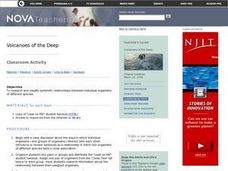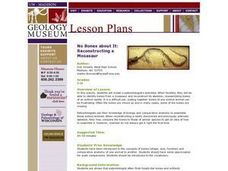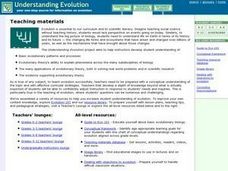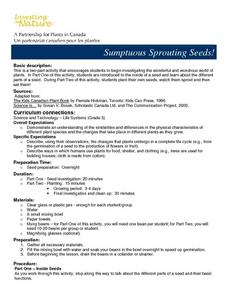Curated OER
Lamarck And Darwin
Students compare Lamarck's mechanism for evolution with Darwin's theory of natural selection.
Curated OER
Giants of the Animal Kingdom
Fourth graders examine the megafauna found in Australia. They create a food web using cut-outs and develop a timeline to show changes in the fauna over time. They draw their own megafauna scene for their classroom.
Curated OER
Volcanoes of the Deep
Students discuss how organisms relate to one another. They work together to research a specific organism and how it relates to other organisms. They present their findings to the class.
Curated OER
Sound for Sight
Students study echolocation and understand how dolphins use it to locate prey, escape predators, and navigate their environment. They view a video, "In the Wild-Dolphins with Robin Williams" and see first hand how dolphins communicate. ...
Curated OER
What's In A Name?
Students explore the concept of the binomial system of nomenclature for classifying organisms. Students travel on a field trip to observe organisms displayed and their common names. Students complete several classroom activities and...
Curated OER
The Superheroes of Public Land Management
Students study public land management agencies and their missions. They research a management agency, design a superhero to represent the agency and describe the skills and training needed to manage public lands. They include the...
Curated OER
Seed Sorting
Students examine and sort seeds. In this life science lesson plan, students make general observations of a tub of seeds, then develop sorting criteria for sorting the deeds. Lesson includes extension activities.
Curated OER
Carrying Capacity of Ecosystems
Students define population and carrying. For this algebra lesson, students explore exponential growth and decay based on animals and things that grow or decrease exponentially. They graph their findings and discuss their results as they...
Curated OER
Collect Data Using a Transect Line
Learners learn about transect lines through a study of marine debris. In this marine debris lesson, students calculate the items on a transect line and graph them. Learners complete a category worksheet.
Curated OER
Hawaiian Bird Beak Adaptation
Students explore adaptation by participating in a lab activity. In this bird characteristics lesson, students discuss the different purposes birds have for their beaks and conduct an experiment testing which beaks collect food best....
Curated OER
Hunting Invertebrate Fossils in the Classroom
Students acquire a general knowledge of fossils and paleontology, the study of evidence of life in the past and identify the major invertebrate groups (phyla) commonly found in the fossil record.
Curated OER
No bones About It -A Mosasaur
Students model a paleontologist's activities. They identify dinosaur bones and reassemble them into a skeleton of an extinct reptile.
Curated OER
Biodiversity Study -- A Unit Study
Students sample a site with low human impact, one with moderate human impact, and a third with high human impact. Students chart the data for each site and then compare the sites and discuss.
Curated OER
SeaWorld: Education, Entertainment, or Exploitation?
Students discuss SeaWorld, research marine animal biology, investigate one animal currently collected by SeaWorld, and decide whether they oppose or support SeaWorld's collection policy. Students then gather information relating to...
Curated OER
Water Wonders
Students explore hydrology concepts. In this environment and biology lesson, students identify and describe macroinvertebrates using a variety of pictures and resources. Students observe and write about a classroom aquarium in which...
Curated OER
Kids for Conservation: Animal Unit
Students discuss animal needs and characteristics. In this animal mini-unit, students complete three activities studying different animals, their needs, how they have evolved, and how to protect them.
Curated OER
Marine Life Research and Persuasive Conservation Pamphlet
Tenth graders examine conservation and research a type of fish that is under environmental stress. In this conservation lesson students create a pamphlet about the conservation of a marine organism.
Curated OER
Making Cladograms
Students construct cladograms (evolutionary trees), showing how shared derived characters can be used to reveal degrees of relationship. They interpret and analyze cladograms, and determine where unclassified vertebrates would fit on a...
Curated OER
Araceli Solis Butterflies Unit
Third graders study the life cycle, eating habits, habitats, and migration patterns of butterflies in this series of lessons.
Curated OER
Tracking Down Traits
Sixth graders list traits that all sixth graders share. They receive worksheets "Tracking Down Traits," working in groups to complete the chart. Students share results with the class and a class summary is tallied. Students discuss the...
Curated OER
Lessons: Food Web
Young scholars use an interactive web-based food web game to gain familiarity with tropic levels and interactions. They already understand that in an ecosystem there are four basic tropic levels: producers, primary consumers, secondary...
Curated OER
Sumptuous Sprouting Seeds!
Third graders investigate the wonderful and wondrous world of plants. They examine the inside of a seed, explore the different parts of a seed, plant their own seeds, watch them sprout and then eat them! They describe, using their...
Curated OER
Stella the Swan
Students analyze the telling of a story with props. They study similarities and differences between ducks, geese and swans, how wildfowl are adapted to life in water, how wildfowl move and feed, and wildfowl family life, how they nest,...
Curated OER
Fossils
Fifth graders study the characteristics of fossils. They create a chart comparing the different fossil size, shape and texture. Students make observations and describe fossil characteristics in journals.

























